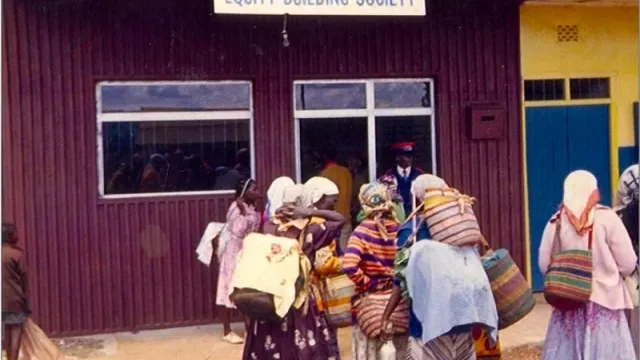Building a banking empire one customer at a time

Building a banking empire one customer at a time
It was the early 90’s, Kenya was rapidly growing.
Into this era of opportunity, a young banker by the name of James Mwangi accepted a job at a small grassroot ‘bank’ known only as Equity Building Society.
It was a small mutual society with barely 12,000 customers. Mostly coffee and tea farmers from rural Kenya.
But Equity Building Society was a technically insolvent organization that was staring at total dissolution.
It had customer deposits of only 22 million shillings, handed out loans amounting to 9 million shillings and had losses in excess of 33 million shillings.

How then did a tiny lender on the verge of collapse end up at the very heart of the Kenyan society, transforming lives and livelihoods of millions of ordinary citizens?
As a young boy in Nyagatugu village, Muranga County, James Mwangi had learnt the basics of the art of entrepreneurship and the value of a communal atmosphere.
He had a reputation of being a smart chap who went on to bring in the first university degree to Nyagatugu village.
Earlier in his career at the now-defunct Trade Bank Group, where he had risen to the rank of Chief Finance Controller - Mwangi had built a certain reputation as a brilliant analyst and as a man not to be taken lightly thanks to his penchant for entering action with boldness.
When the man, James Mwangi, took over the stewardship of Equity Building Society from its founder and Chairman Dr Peter Munga, he knew exactly where to start. The customer.

Unlike other banking executives of those days, Mwangi was a person of rare democracy and extraordinary empathy.
Going forward, his customers were not to be subjected to monthly ledger fees, minimum balance requirements, or registration fees of any kind. They could also access small unsecured loans.
Mwangi essentially brought his customers to a climax of hustle-free banking experiences that were accommodative to everyone.
Customer numbers took off like a rocket, making other rigid lenders look like an under-performance.
It was nothing less than masterful.
“I simply wanted to remove the barriers for people, like my mother, in opening bank accounts. We could do better than a mattress!” He told Forbes Magazine in a previous interview.
Dr Mwangi became a hard-charging manager who was relentlessly focusing on a customer-centric model.
This was the one principle that saw Equity Building Society morph into one of the largest Pan African financial organizations now known as Equity Bank Group.
From its twelve thousand frustrated customers back in 1993, Equity bank now boasts of nearly fifteen million customers in six African countries.
The group now has a combined balance sheet of well above 500 billion shillings and an NSE market capitalization that is fast approaching 200 billion shillings.
It’s not difficult to view Dr James Mwangi as the Oracle of Pan African Banking.
His banking model of inclusion which thrives on democratizing the very act of banking itself, and then spreading it to as many people as possible has been analyzed in case-studies at Harvard, Stanford, Columbia, Lagos Business School and other ivy league business schools.
But the hallmarks of the success of his model is its openness for adaptation to the current times and its friendliness to the new millennial customer.
Dr Mwangi has been aggressively driving a digital transformation that has seen Equity Bank engineer of a buffet of digital banking alternatives to further simplify banking and to drive efficient operations within the bank.
In building Equity Bank to what it is today, Dr Mwangi has also amassed a handsome fortune, spending his riches in ways that inspires the Kenyan society.
For instance, of the Ksh 1.1 Billion donation that Equity Group and the MasterCard foundation pumped into Kenya’s COVID-19 war chest, Ksh 300 Million was a personal donation from him and his family.
“It’s humbling to know that the child my mother raised has not changed and I’m able to share what I have with others,” He says.



